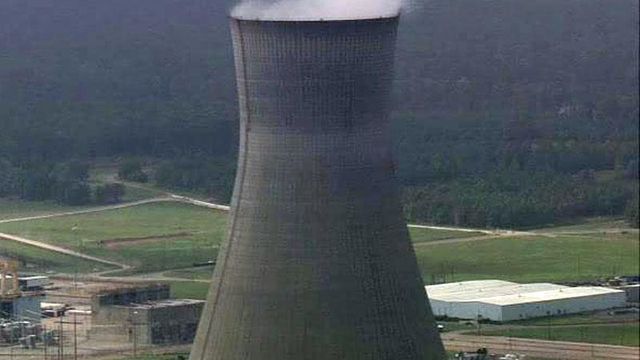Duke, Progress Energy stand by plans to expand nuclear power
Despite a nuclear crisis looming in Japan, North Carolina's two largest utilities remain focused on bringing new nuclear plants to the state.
Posted — UpdatedDuke officials appeared before the North Carolina Utilities Commission on Tuesday requesting approval to spend $459 million in development costs for a two-unit nuclear plant near Gaffney, S.C.
Duke is awaiting federal approval to build the $11 billion plant. The request on Tuesday would cover development expenses for the plant until 2013.
"Our commitment hasn't faltered," Duke Energy President and CEO Jim Rogers said.
The company has already spent $170 million on the plant, which they hope to make operational by 2020.
Progress Energy, which is in the midst of a merger with Duke, has plans to build two reactors at the Shearon Harris nuclear site in Wake County.
Both companies admit that they can't predict if fears over Japan's problems will affect their expansion plans.
On Tuesday, Japan's Fukushima Dai-ichi nuclear power plant emitted a burst of radiation, following an explosion and fire. Days earlier the plant was damaged by a deadly tsunami and earthquake.
Officials have been struggling to address the failure of safety systems at several of the plant's reactors since Friday's twin disasters.
"Common sense tells me that the accident is going to force some rethinking of the role of nuclear. How much rethinking is not clear," Rogers said.
Rogers stressed that in the United States 70 percent of carbon-free electricity comes from nuclear power.
Progress Energy spokesman Mike Hughes agreed that nuclear power is important now and in the future.
The North Carolina Utilities Commission has six months to decide on Duke's request. South Carolina regulators will take a similar look at the project within months.
The company is not legally required to seek the commission's approval to spend the money on the plant. If the commission does agree it is prudent for Duke to move forward with its plans, that could put the company in a better position to get the commission's approval for a rate increase later.
Duke said it won't proceed with the project unless North Carolina changes state law so that it can start charging consumers before the nuclear plant is completed. Legislation hasn't yet been introduced in the legislature.
During Tuesday's meeting, some citizens feared the cost of the plant would be passed on to customers in the form of rate increases.
"We certainly don't need to make rate-payers pay upfront for expensive nuclear plants that the maker will not finance," Charlotte resident Beth Henry said.
Duke operates two nuclear units at McGuire Nuclear Station in Mecklenburg County. It has three units at Oconee Nuclear Station in Oconee County, S.C., and two at Catawba Nuclear Station in York County, S.C.
Oconee began operation in 1973 and at full capacity, its three units produce over 2,500 megawatts.
McGuire and Catawba nuclear stations each have two nuclear units with a total generating capacity of more than 2,200 megawatts.
Duke's nuclear fleet provides electricity to about half of its customers in the Carolinas, company officials said.
Along with Shearon Harris, Progress Energy operates the Brunswick plant in Southport, the Robinson plant in Harstville, S.C., and the Crystal River plant in Florida.
• Credits
Copyright 2024 by WRAL.com and the Associated Press. All rights reserved. This material may not be published, broadcast, rewritten or redistributed.






